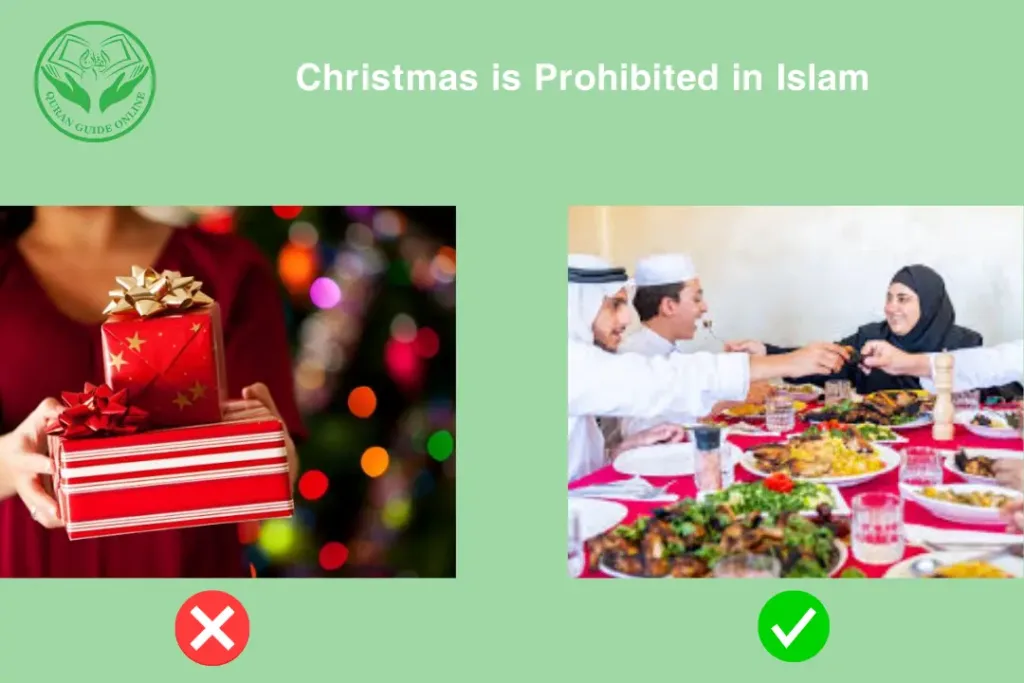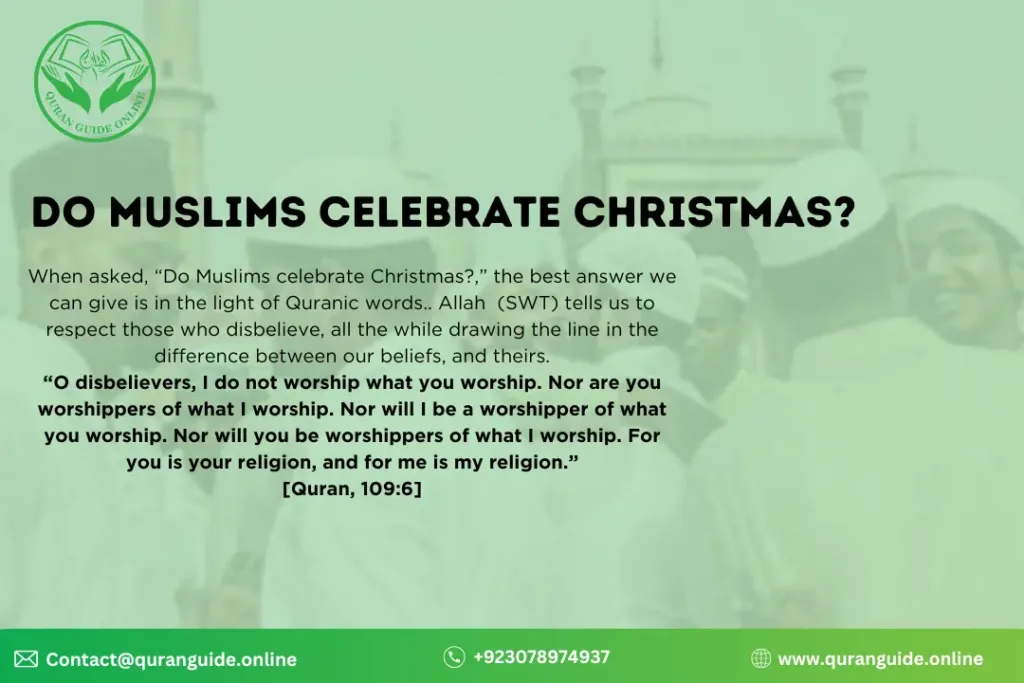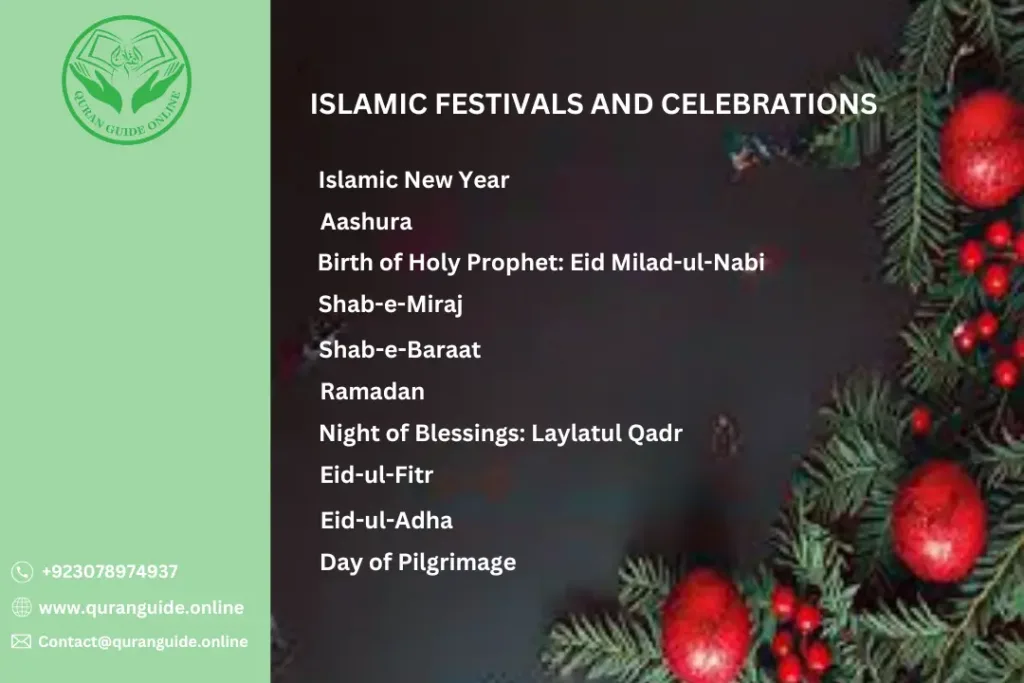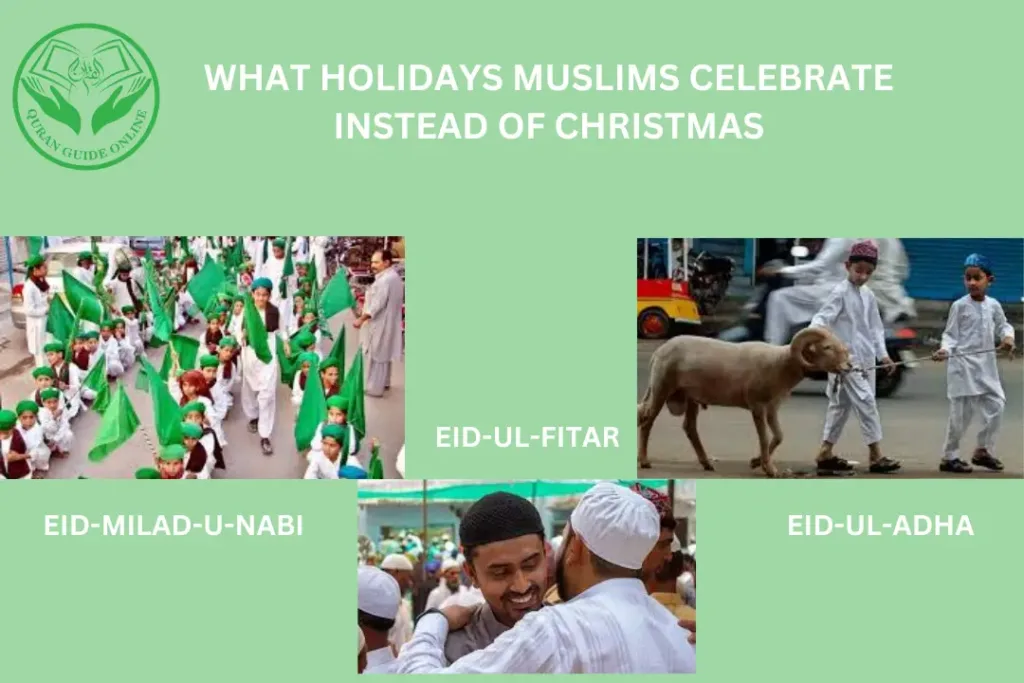What do Muslims Celebrate Instead of Christmas? A Comprehensive Guide
Introduction:

Are you getting confused about What Muslims Celebrate Instead of Christmas? Yes, Muslims celebrate many religious occasions and holidays throughout the year. There are some main festivals of Islam, such as Eid-ul-Fitar, Eid-ul-Azha, Ramadan, Eid Milad-ul- and Lailat-ul-Qadar. Muslims celebrate Eid-ul-Fitar at the end of the holy month of Ramadan at the 1st Shawal. Muslims give thanks to Allah on Eid al-Fitr for meeting their fasting requirements. Eid-ul-Adha, also known as the Festival of Sacrifice,. Muslims celebrate and remember Prophet Ibrahim’s sacrifice of his son Isma’il.
Likewise, we as Muslims celebrate Eid Milad-ul-Nabi for the birth of our Holy Prophet (SAW). Allah pak awarded Lailat-ul-Qadar, a holy night in the holy month of Ramadan Sharif. In this article, I‘ll explain Islamic occasions. These celebrations are in keeping with the teachings of Islam, which include selflessness, charity, and unity between people.
Even though People of different religions celebrate Christmas throughout the world, Muslims find spiritual fulfillment and solidarity in their own customs.
Shaykh al-Islam Ibn Taymiyah Quote:

Shaykh al-Islam Ibn Taymiyah (may Allah have mercy on him) was asked about a Muslim who makes the food of the Christians on Nawruz (Persian New Year) and on all their occasions, such as Epiphany and other feast days, and who sells them things to help them celebrate their festivals.
Is it permissible for Muslims to do any of these things or not?
He replied:
“Praise be to Allah. It is not permissible for Muslims to imitate them in any way that is unique to their festivals, whether it be food, clothes, bathing, lighting fires or refraining from usual work or worship, and so on. And it is not permissible to give a feast or to exchange gifts or to sell things that help them to celebrate their festivals or to let children and others play the games that are played on their festivals, or to adorn oneself or put up decorations.
What did the Quran say about Christmas?
On the occasion of Christmas, different religions, including Christianity and some Muslims, also celebrate it with gift-giving, tree-lighting, and house-lighting. It’s a fun activity for children, and some Muslim families celebrate it as Prophet Jesus’ birthday. In contrast, some Muslims celebrate Eid-ul-Azha rather than Christmas and decorate their homes with green or white lights from the beginning of Ramadan until the end of Eid-ul-Azha. They give and receive gifts from Muslim friends on both Eids. There is still no known position of Islam on these issues.
When asked, “Do Muslims celebrate Christmas?,” the best answer we can give is in the light of Quranic words.. Allah (SWT) tells us to respect those who disbelieve, all the while drawing the line between our beliefs, and theirs.
“O disbelievers, I do not worship what you worship. Nor are you worshippers of what I worship. Nor will I be a worshipper of what you worship. Nor will you be worshippers of what I worship. For you is your religion, and for me is my religion.”
[Quran, 109:6]
Do Islam Celebrate Christmas?
So Now we are going to discuss, how is celebrating Christmas for Muslims.
Muslims generally do not observe Christmas because it is a Christian festival. A small percentage of Muslims participate in social events, greetings, and holiday decorations. People of different faiths view Christmas as a time for amicable coexistence and kindness. Some Muslims use charitable giving or volunteer labor as a way to uphold Islamic principles. Although Muslims recognize the cultural significance of Christmas, Islamic tradition does not include religious commemoration of the holiday. Throughout the year, Muslims have their religious holidays and festivals.
What Festivals Do Islam Celebrate? Significance of Pillars of Islam

- Islamic New Year:
- Aashura:
- Birth of Holy Prophet: Eid Milad-ul-Nabi
- Shab-e-Miraj:
- Shab-e-Baraat:
- Ramadan:
- Night of Blessings: Laylatul Qadr
- Eid-ul-Fitr:
- Eid-ul-Adha:
- Day of Pilgrimage:
As we have our own festivals mentioned above. Now we’ll have a glance on the significance of all these festivals, Lets discuss:
Islamic New Year:
First of all, Muharram is the first month of the Islamic new year and honors the Prophet Muhammad’s journey from Mecca to Medina, It is the foundation of the Islamic era and made Medina’s first Muslim community at that time of migration. Muslims pay attention to Prophet Muhammad’s teachings, perform acts of devotion, prayer, and self-analysis, and enhance their relationship with Allah. The Islamic New Year brings together the Muslim community and strengthens the whole Muslim Ummah.
Aashura:
Secondly, Ashura is observed as a day of remembrance for Imam Hussain, the grandson of Prophet Muhammad, who endured great suffering and hardship at the hands of the Umayyad Caliphate during the Battle of Karbala. This day is marked by mourning and reflection on the principles of justice and sacrifice exemplified by Imam Hussain’s stand against oppression.
Muslims reflected their loyalty at that time to Islam and sacrificed their lives for the existence of Islam. Aashura is a reminder of the eternal struggle between truth and lies, righteousness and oppression, and a lasting legacy for those who fight injustice..
Birth of Holy Prophet: Eid Milad-ul-Nabi
Thirdly, the Muslims honor the birth of Prophet Muhammad (SAW) on this day. Nobody can deny the significance of this day. This is a time of reflection, gratitude, and love for the Prophet’s teachings. In the light of his exemplary character and compassion, Muslims have deepened their understanding of the Prophet’s life and legacy.
Milad Un Eid Nabi also reaffirms the commitment of Muslims to abide by the Sunnah and Prophet Muhammad’s noble character, as well as promote unity and peace. Muslims are renewing their faith, building brotherhood, and preaching the teachings of Islam in all aspects of Islam.
Shab-e-Miraj:
As this night is special in Islam and has much significance for followers of Islam. It’s a journey Prophet Muhammad must have taken many years before. Muslims believe that the Prophet left Mecca and flew to Jerusalem on this night, meeting God in heaven. People pray and read the Quran to remember Shabeiraj. It is a time to reflect on the Prophet’s journey and how he taught people to be good and obey God’s laws. ShabeShawnMiraj reminds Muslims that the Prophet was very close to God, and he showed us how to live properly.
Shab-e-Baraat:
Shab-e-Baraat is the Holy Night, full of blessings. In the Holy month of Shaban, that happens on its 15th night. Muslims believe that on this night Allah Pak decides the fate of people in the coming year. Allah pak also forgives the people for their mistakes if they are sorry.
And definitely, Muslims pray to Allah and ask for forgiveness for their sins. It’s a great chance to reconnect with Allah and try to be kinder to their creatures and better people than earlier. They’re helping others and sharing with those who need help to show they’re sorry for what they’ve done.
Ramdhan: A Special Month For Muslims
Fasting is such a Holy act or practice which compels Muslims to abstain from food and drink. This is the month of Blessings and Blessings. Ramadan is important because it commemorates the Prophet Muhammad receiving the revelation of the Quran. • Muslims fast until dusk, breaking for Iftar, and get up before dawn to eat Suhoor. For those who are less fortunate, fasting cultivates selfcontrol, gratitude, and empathy.
Ramadan is a time for increased prayer, Quran reading, and good deeds, with Muslims believing prayers are answered faster and good actions earn rewards.
Night of Blessings: Laylatul Qadr( Subhan Allah)
It is also known as the “Night of Decree or Power. The Muslims believe it to be one of the last ten nights of Ramadan. Muslims spend this night in prayer and worship, pleading for Allah’s favors and pardon. Many Muslims remain up late reading and praying from the Quran.
So, It’s a period for introspection, adoration, and seeking intimacy with Allah.
Eid-ul-Fitr:
Here is the Overview of Eid ul Fitr Celebrations
In addition, It marks the conclusion of fasting throughout the holy month of Ramadan.
Muslims get together early to worship on Eid. After the prayer, well wishes and greetings are given. Children frequently receive money from their elders, relatives Friends, and family as gifts. To help the less fortunate, many Muslims make charitable donations and many more. Zakat and Fitranna are the obligations of this event also. Families prepare delicious delicacies for the holiday, which centers around food; Eid ul Fitr is a time for joy, thankfulness, and showing compassion and love.
Eid-ul-Adha:
Eid ul Adha is celebrated on 1oth of Dhu al-Hijjah, an Islamic holiday honoring Prophet Ibrahim’s sacrifice of his son Isma’il. Muslims offer animals like Sheep, goats, Cows, and Camel as a symbol. Then the meat of these animals is divided into three portions, saved for family, shared with friends, and donated to those in need and less fortunate. Eid ul Adha also emphasizes and is a great symbol of sacrifice, obedience, faith, generosity, charity, and compassion towards others.
Day of Pilgrimage:
The journey to Makkah starts on the ninth day of the Islamic month of Dhu al-Hijjah, which is also the second day of the Hajj, the annual Islamic pilgrimage to Mecca. It’s a time of great significance for Muslims around the world, as they gather in the holy city to perform rituals that commemorate the actions of the Prophet Ibrahim (Abraham) and his family. Hajj is one of the five pillars of Islam and is required of all Muslims who are physically and financially able to undertake it at least once in their lifetime.
Lastly, Prophet Muhammad gives a farewell lecture at Mount Arafat, where pilgrims assemble for the Hajj ceremony. The sermon emphasizes equality, fraternity, and submission.
Day of fasting and prayer; believed to atone for sins and bring rewards from Allah; regarded as one of the most blessed days, celebrated with piety and devotion across the globe; special significance for non-Hajj Muslims.
What do Muslims do for Christmas?
Since Christmas is a Christian festival, Muslims generally do not observe it.
A small percentage of Muslims participate in social events, greetings, and holiday decorations.
Furthermore, people of different faiths view Christmas as a time for amicable coexistence and kindness.
Some Muslims use charitable giving or volunteer labor as a way to uphold Islamic principles.
Although Muslims recognize the cultural significance of Christmas, Islamic tradition does not include religious commemoration of the holiday.
Additionally, throughout the year, Muslims have their religious holidays and festivals.
FAQs:
1: Can Muslims accept Christmas gifts?
Ans: No, Especially discriminating the religion, Muslims can’t accept gifts.
2: Can Muslims celebrate Christmas?
Ans: No, not at all. Muslims are not allowed to celebrate Christmas. It is strictly prohibited in Islam.
3: Do Muslims celebrate the birth of Jesus?
Ans: Regardless of the divergent theological meanings and other important differences attributed to this event, Islam honors Jesus’ birth almost as much as Christianity. The Quran even highlights his birthday, quoting Jesus saying, “Peace be upon me the day I was born” (19:33)
4: Do Muslims have a Christmas equivalent?
Ans: Yes, off course. Muslims celebrate Eid-ul-Fitr and Eid-ul-Adha, two significant holidays. Eid-ul-Fitr marks the end of Ramadan, a holy month, and is a time for prayer, feasting, and giving gifts. Eid-ul-Adha commemorates Ibrahim’s sacrifice and is a time of community, charity, and celebration.
5: Is Friday a holy day in Islam?
Ans: Friday is the holy day of Islam. Muslim community celebrates with the Jumu’ah prayer, the congregational prayer consisting of a sermon and two rak’ahs. It’s the best day of the week, and Muslims do pray more and try to seek more blessings . As Prophet Muhammad said, Friday is also a day of spiritual renewal, forgiveness, and divine mercy.
Conclusion: What Muslims should do at Christmas?
Concluding my topic, I would like to summarize, “What do Muslims celebrate instead of Christmas?” Muslims don’t celebrate Christmas because of cultural and spiritual reasons that are ingrained in their beliefs. The idea of Tawhid, or the oneness of God, emphasizes monotheism and Allah’s uniqueness. Christmas is a Christian holiday observed by Christians, while Muslims consider Jesus to be a prophet rather than the son of God. And they celebrate Eid ul Fitar, Eid ul Azha as their two main festivals. It is viewed as merging into another culture rather than respecting Islamic beliefs to celebrate non-Muslim holidays like Christmas.
Moreover, the secularization and commercialization of Christmas, typified by materialism and consumerism, has eclipsed its religious importance. There may be pressure on minorities to adapt into the majority culture, but many Muslims reject this temptation in order to stand up for their cultural and religious identity.

